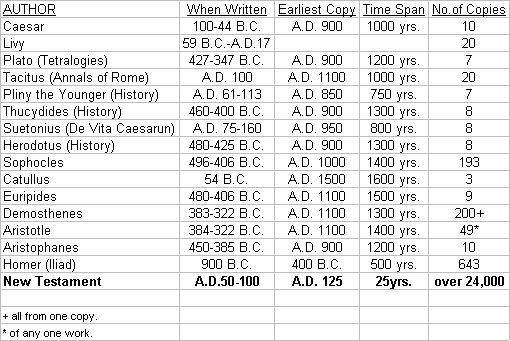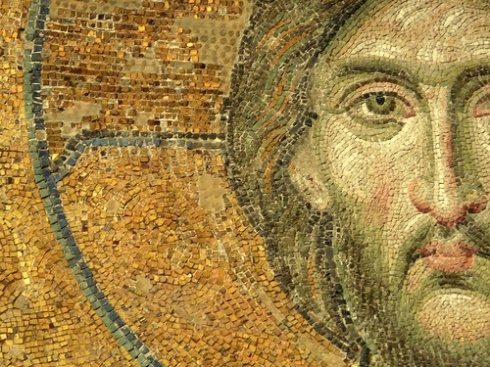
Luke 1:1-4 Inasmuch as many have undertaken to compile an account of the things accomplished among us, 2 just as they were handed down to us by those who from the beginning were eyewitnesses and servants of the word, 3 it seemed fitting for me as well, having investigated everything carefully from the beginning, to write it out for you in consecutive order, most excellent Theophilus; 4 so that you may know the exact truth about the things you have been taught.
Introduction:
In our last post, we began to consider crafting an argument "to" biblical inerrancy here:
http://www.growingchristianresources.com/2019/01/arguing-to-inerrancy-begins-by.html.
Inerrancy is the doctrine that states that all the words of the Bible, as originally given through the prophets and apostles, are totally true. In this series of posts, we are aiming to bridge an argument "to" inerrancy. This approach to discussing the Bible with skeptics has the advantage of establishing a base-line with which we can talk to them about the Bible as a historical text - a claim which is vital for Christianity and one which they can examine to follow the evidence where it leads. Leading Christian defenders of Christianity (a.k.a "apologists"), such as William Lane Craig, Norman Geisler, R.C. Sproul, Frank Turek and others advocate a very similar approach to what I'm outlining in this series of posts. We discussed four key terms that would provide such a bridge:
1. Preservation
2. Reliability
3. Jesus' teaching about the scriptures
4. Inerrancy
Reviewing what we mean by the preservation of the words of the Bible
Even though we do not have the original manuscripts of either the Old or New Testament, it remains the case we can say with confidence that we have the words of the original in our copies and translations, just as any classical scholar would assert for the writings of the great philosophers or founders of other religions.
The truth of the preservation of the words of scripture won't get us to the doctrine of inerrancy by itself. The case we're making is what we call a "cumulative case" - meaning that each piece of the argument is taken together to bring us to a conclusion that makes holding inerrancy a very reasonable position for the Christian. Having established that we do have the words of the original documents in the midst of our copies and translations of the Bible, we can now proceed on to the next plank of our bridge to inerrancy, namely, the reliability of the biblical text.
Why the issue of historical reliability is relevant to Christianity
When we looked at the preservation of the words of the Bible, we were dealing with matters pertaining to the text itself. Reliability is a very important issue, since the Christian faith is rooted in the historical dealings of God with His people - Israel - in the Old Testament and the life, death and resurrection of Jesus in the New Testament. Such a historical investigation will yield that the biblical text is reliable enough to be considered certified history by even secular historians. The relevance of the topic of reliability is crucial whenever we compare other religions which make similar claims about inerrancy for their religious books.
For instance, I have read the Book of Mormon from cover to cover. Despite its references to numerous geographical locations, ancient people groups and alleged links between Native American tribes and the ancient Jews, not a single claim is attested by archaeological, scientific or historical investigation. In as much as Mormonism basis its doctrine on historical events, nonetheless, the very collection of texts upon which it is based ("Book of Mormon", "Pearl of Great Price" and "Doctrines and Covenants") are not proved by history.
If a text is ever to live up to its claims of inerrancy, it has to at least demonstrate reliability. In order to keep our post concise and to the point today, we will focus particularly on the New Testament text and even more specifically on the gospel records themselves.
Assessing the reliability of the New Testament Gospels
When we begin to assess the reliability of the New Testament text, we can do so in two ways:
1. Comparing the the time span between the originals and copies.
2. Evaluating details reported by the New Testament text to external documents from the same time period.
Comparing the span of time from the original manuscripts to earliest copies
First, we note the amount of time that spans from the date of the original manuscripts and selves to the earliest copies that we have of the given document. The chart below derives from the American Journal of Theology:

History and philosophy departments at major universities study the great classical historians and philosophers with no quibbles as to whether they are studying reliable manuscripts. Such a procedure gives us perspective when comparing New Testament to other ancient documents.
In a similar chart, Norman Geisler and Frank Turek in their book: "Why I Do Not Have Enough Faith To Be An Atheist", page 226, show that the philosopher Plato, in terms of his writings, has a span of 1200 years between what would had been his original drafts and the copies that we have today. When compared to the New Testament documents, we have some ancient manuscripts going to within 25 years of the writing of the New Testament. Whenever we compared the New Testament to other ancient documents written by writers such as Homer, Demosthenes, Herodotus, and Tacitus, we find on average a time span of 400 to 1,000 years between the original composition and its earliest copies. This on average means that the New Testament far outpaces it's ancient competitors by a ratio of 10:1 when it comes to assessing the reliability of the manuscripts in the New Testament.
With respect to the number of copies or manuscripts that we possess in the New Testament, the sheer number is overwhelming when compared to other ancient documents. Homer's Iliad, for example, has roughly 1,800 copies in existence today. However, the New Testament has 5800 Greek manuscripts spanning from the late 2nd Century to the Middle Ages. As New Testament scholar Dr. Daniel Wallace has noted, we have, as it were: "an embarrassment of riches" when it comes to the sheer amount of manuscript evidence for the New Testament.
Comparing the details of the New Testament to other contemporary documents of the same time period
As we assess the reliability of the New Testament text on the basis of the sheer amount of physical evidence, we can also compare particular details of the New Testament to external sources. One of the best illustrations is to survey the first century Jewish historian, Josephus. Josephus was contemporary of the Apostles and wrote his volumes "Antiquities of the Jews" and "Jewish Wars" prior to and after the fall of Jerusalem in 70 AD.
Dr. Timothy McGrew of Michigan State University gives many examples from Josephus' writings to illustrate how we can test the reliability of the Gospel records. I'll just mention two:
1. Luke 3:2 records - "in the high priesthood of Annas and Caiaphas, the word of God came to John, the son of Zacharias, in the wilderness." Yet, only one of them is named as high priest, namely Caiaphas, as indicated in John 18:13 and 18:24. Are the gospel records in conflict? Timothy McGrew points out that the historian Josephus in his work "Antiquities of the Jews", book 18 chapter 2 section 2 and his other work, "Jewish Wars", Book 2 chapter 12 section 6, describe how Jonathan and Annas' are both high priests as described in Luke. Per Josephus' reports, there was a short time when Roman Procurators (like Pilate) could appointed high priests for political purposes. On occasion, there could be two men occupying the same office - with one being the actual high priest and the other being the political figurehead. Even in our modern American context, we still call former office-holders of the Oval Office "President", even though the current office-holder is the actual "President of the United States". So, the gospel record is validated as exemplifying typical first-century expressions of leadership roles.
2. Matthew 2:22 says not that "Archelaus was King" but rather he was "reigning in the place of his father Herod" (ESV, NIV, NASB). According to Josephus' book, "Antiquities of the Jews", book 17 chapter 9 Section 5, Archelaus presumes himself to be a king, even though he was never officially crowned as one. Again, we find the gospel of Matthew historically validated and thus, reliable. Such interlocking relationships between two different texts that record the same event, wherein neither author consulted the other, is what scholars refer to as "undesigned coincidences". We see this trait in Greco-Romans histories. Such a characteristic counts as a mark of genuine historicity.
The particulars about Jesus' life, death and resurrection are found, under scrutiny, to bear the same "ring" of historical reliability as observed above. Scholars sometime talk about the "edges" of the Gospel accounts and the "core". We've seen examples of incidental details that serve as "backdrop" or "edges" of the Gospel records (think of whenever one puts a puzzle together, we typically begin with the edge pieces"). If we find reliable the "edges" of the Gospel records, can the same be said of the "core" (Jesus, life, death, resurrection)?
Whenever we consider the life, crucifixion and resurrection of Jesus, recorded in all four Gospels, we discover that over 12 sources report details of the historical Jesus that match in general with the particulars we find in the Gospel records. Below is but a sampling:
1. Josephus "Antiquities of the Jews", Book 18, section 63:
"Now, there was about this time Jesus, a wise man, if it be lawful to call him a man, for he was a doer of wonderful works—a teacher of such men as receive the truth with pleasure. He drew over to him both many of the Jews, and many of the Gentiles."
2. Jewish sources such as the Babylonian Talmud, in its reference "Sanhedrin 43", record that Jesus was a worker of miracles, accused by the Jews of practicing sorcery".
3. Other secular sources such as the Syrian historian Mara Ben Serapion and the Roman historian Tacitus record a man named "Jesus" or "Chrestus" as having existed, died by crucifixion and being the source of what they allege as a "mischievous superstition" - a probable reference to the Christian proclamation of the resurrection.
4. There are even some short statements in Josephus' works that record how Jesus' disciples were proclaiming his resurrection from the dead (compare his "Antiquities of the Jews, Book 18, sections 63-64).
5. Some critics today try to dismiss the Gospels as "fiction", claiming that Jesus was a fictional character invented by the early church. Yet, historians who specialize in the history of the first century include the Gospel records as historical sources for the historical Jesus. To dismiss the Gospels on the grounds that they are "Christian literature" or "religious literature" commits what is called the "genetic fallacy" (questioning a belief on the basis of how it developed). Both the Gospel accounts and external sources provide the following general outline of Jesus:
A. He was born in Bethlehem, raised in Nazareth and exercised a ministry of teaching and miracle working.
B. Jesus was unjustly accused and sentenced to death by Roman crucifixion on charges of sedition, violation of the Sabbath and blasphemy.
C. Pontius Pilate proceeded over Jesus' sentencing and the Jewish high priest Caiaphus and his father-in-law Annas delivered the charges leading to Jesus' crucifixion.
D. The tomb of Jesus was discovered empty by Jesus' closest followers on the third day following His interment. The disciples experienced encounters with the Risen Christ. The Jews tried to cover-up the empty tomb by saying the body was stolen. However, the explosive growth and spread of Christianity within years of its inception cannot be explained by appeals to natural causes.
Whenever we consider that there are more ancient sources record the historicity of Jesus than Julius Caesar, the idea of Jesus being a myth is shown preposterous.
Closing thoughts:
The point of this survey is to demonstrate that the gospel records of Jesus life are reliable. We must include the Gospel records as primary sources that reliably record the life, death and resurrection of Jesus (with external sources providing secondary attestation). The gospels are indeed reliable documents. They take us back to the life, sayings, death, and resurrection of Jesus Christ. Therefore, we can conclude that we have not only the words of the Bible with us today, but that what the Bible reports is reliable history. The next post will give us the most important "plank" in our argument "to" inerrancy when we look at Jesus' teaching about the scriptures.






